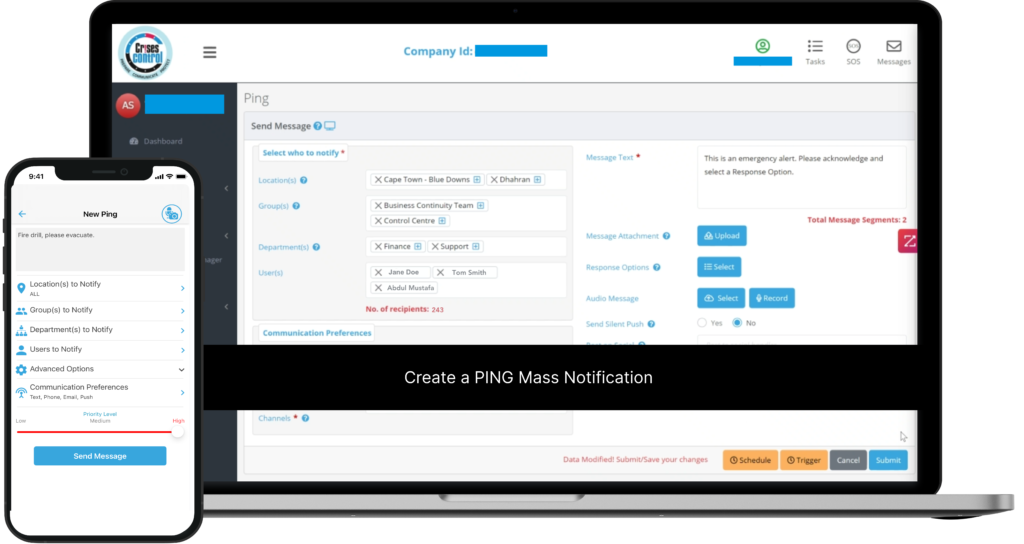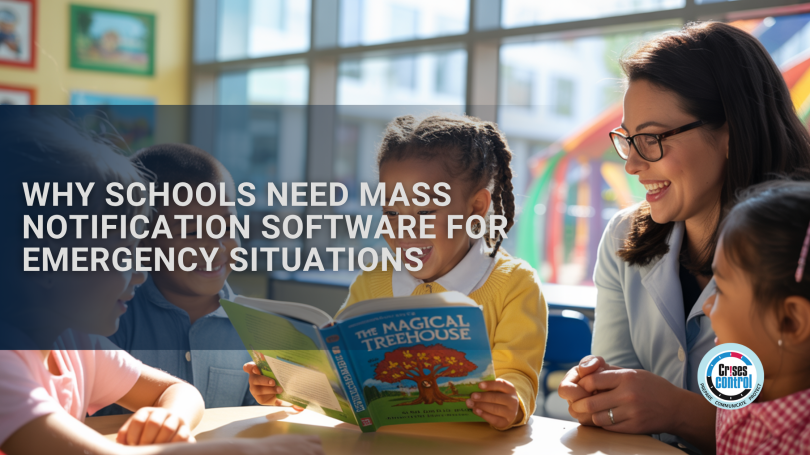Written by Anneri Fourie | Crises Control Executive
When Every Second Matters in a School Emergency
At 10:15 on a quiet Tuesday morning, a fire alarm sounds in the science block. Staff are unsure whether it’s a drill or a real incident. Students start filing out, but there’s confusion about which exits are safe. In the school office, someone scrambles to contact heads of year. Parents begin calling the front desk after spotting emergency services outside on social media.
This kind of situation isn’t uncommon. And without the right tools, it can quickly spiral into panic and delay.
Schools have a duty to protect their students and staff, not only by responding effectively to emergencies, but by communicating clearly, instantly and reliably with everyone involved. This is where Mass Notification Software becomes essential. It’s not just a piece of technology; it’s a core part of a modern safeguarding strategy.
In this blog, we’ll explain what Mass Notification Software is, why it’s increasingly vital in schools and colleges, and how Crises Control offers a solution that is purpose-built for the education sector.
Why Traditional Communication Methods Aren’t Enough
Most schools still rely on a combination of emails, intercom systems, staff radios and, in some cases, phone trees to manage emergency communication. While these can work in simple scenarios, they break down when time is tight or when different groups (like parents, staff, students and emergency services) all need different types of information at once.
Imagine trying to coordinate a lockdown using only email. Or trying to contact hundreds of parents during a power outage. Manual processes take too long and often rely on the availability and judgement of individual staff members during stressful moments.
Emergencies are unpredictable, but communication doesn’t have to be. Mass Notification Software removes delay and uncertainty by automating messages, sending them instantly across multiple channels and devices, and giving school leaders complete visibility over who’s received them and who has responded.
What Is Mass Notification Software and How Does It Work?
Mass Notification Software (MNS) allows schools to send time-critical messages to a large group of people using different communication channels at once, including:
- SMS/text messages
- Emails
- Voice calls
- Mobile app alerts
- Microsoft Teams Messages
- Desktop notifications
More advanced systems, like Crises Control, also include features such as:
- Pre-configured emergency workflows
- Geo-targeted alerts
- Two-way messaging
- Role-based communications
- Real-time reporting and audit trails
This means that in the event of an emergency, you don’t have to think about who to message, what to say or how to send it, the system does it for you, automatically and instantly.
Real Risks Facing Schools Today
Mass Notification Software isn’t a nice-to-have. It’s a response to the very real risks that schools face, including:
- Lockdowns due to intruders or local incidents
- Fires or gas leaks
- Severe weather or flooding
- Public health issues (like illness outbreaks)
- Power or network failures
- Cyber attacks
- Bomb threats or suspicious packages
Even a minor incident can cause major disruption if handled poorly. The ability to communicate calmly, clearly and consistently can reduce confusion, avoid panic and help keep people safe.
How Mass Notification Software Helps During Emergencies
Here’s how a well-designed Mass Notification System for schools can make a difference:
1. Speed and Reach
Time matters. Crises Control enables schools to notify all relevant groups within seconds. Alerts can go out via SMS, voice call, Microsoft Teams, app notification and email at the same time, so no one misses out.
2. Pre-Built Emergency Plans
In an emergency, you don’t want to spend time drafting a message or figuring out who to send it to. Crises Control lets you create ready-made workflows for specific incidents, like lockdowns, evacuations or severe weather, so everything is ready to launch in just a few clicks.
3. Two-Way Communication
Getting information out is only half the job. Crises Control also allows staff and students to respond, confirm their safety, share their location or flag issues in real time. This supports faster and more informed decisions during evolving situations.
4. Geo-Targeted Alerts
Not all incidents affect the whole school. Crises Control lets you send alerts based on location, so only those in the impacted area receive the message. This avoids unnecessary alarm and keeps communication focused.
5. Incident Reporting and Compliance
After an event, schools are often required to provide evidence of how they responded. Crises Control keeps detailed records of all communication, including timestamps and delivery reports, which helps meet safeguarding and regulatory requirements.
Why Choose Crises Control?
Crises Control is not a generic alert system. It is a purpose-built platform designed for organisations with complex needs, including schools, colleges and multi-academy trusts. What sets it apart?
- Cloud-based and scalable: Whether you’re a small primary school or a large university, Crises Control fits your structure.
- Easy to use: The platform is designed for non-technical users to act quickly and confidently.
- Fast to implement: Set-up is simple, and our team provides full onboarding support, including training.
- Secure and compliant: Fully GDPR-compliant and built with security at its core.
- Always available: With 99.5% uptime, Crises Control is available 24/7, 365 days a year.
- Proven impact: Schools using Crises Control have reported a 20% improvement in incident resolution times.
“Crises Control gave us the peace of mind that, in any emergency, we have a clear plan and a way to keep everyone informed in real time.” – Headmaster, UK Secondary School
Interested in our Ping Mass Notification Software?
Efficiently alert everyone in seconds at scale with our Mass Notification Software – PING, get the message out fast and ensure rapid response and recovery.

What to Consider When Choosing a Mass Notification System for Your School
If you’re exploring solutions, here are some questions to guide your decision:
- Will it let us send alerts across multiple channels at once?
- Can we create pre-built templates for different emergency scenarios?
- Does it offer two-way communication and tracking?
- Can we send alerts to specific locations or user groups?
- Is the system easy to use under pressure, even for non-technical staff?
- What level of support and training is included?
Crises Control answers yes to all of these, and provides much more.
Final Thoughts: Better Prepared Means Safer Schools
Emergencies are unpredictable, but your response doesn’t have to be. With the right system in place, schools can react faster, communicate more clearly, and protect their communities more effectively.
Mass Notification Software isn’t just about sending messages. It’s about ensuring the right people get the right information at the right time, every time.
With Crises Control, you’re not just buying software. You’re gaining a trusted partner in school safety and emergency planning.
Ready to see how it works?
Request a free demo today and find out how Crises Control can help your school stay connected, responsive, and safe in any situation.
Request a FREE Demo

